SEO has changed a lot in the past few decades. Being an SEO agency in Singapore for the past 10 years, we pay close attention to these changes and know that the focus is now on understanding natural language and the complex relationships between pieces of information on a page.
Keyword Clusters Can Help You Improve Your SEO Strategy
In the past few years, Google’s engineering team has worked hard to improve natural language processing in order to better understand the complex relationships between on-page material. Google can now understand words better thanks to neural matching, and BERT has helped it understand how complicated prepositions are.
Google is getting better at picking up on literary nuances with each core update. Despite these improvements, though, a lot of website owners still only use a few keywords to optimise their sites, which is becoming less and less useful.
We at Nightowl SEO agency, have been paying close attention to how Google has changed since the beginning, and we think it’s time to move into the new era of on-page SEO. As Google keeps improving its ability to understand natural language, it’s important that our on-page SEO techniques change at the same time to keep up with these technological advances.
So, how can we improve our on-page optimisations to keep up with how Google’s technology is changing?
Keyword clustering is the answer.
What Is An Example Of A Content Cluster
So, what are keyword clusters exactly? Simply put, keyword clusters are collections of related keywords that represent the same search intention. Take the words “yacht charter”, “boat charter” and “private yacht charter” as an example. These are different keyword phrases, but they all refer to people who want to charter a yacht
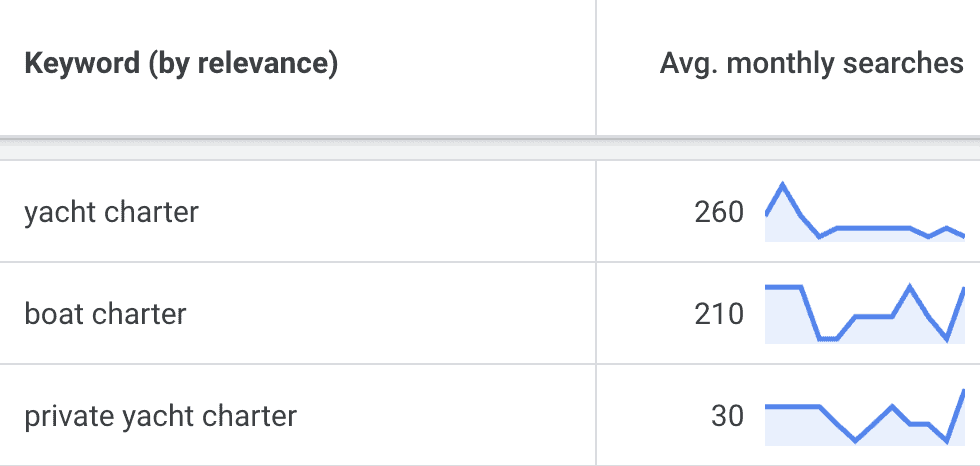
Imagine that you charter a yacht under your name. If you only tried to rank for the first keyword, your brand’s online exposure would be much less. But if your page is optimised for the main keyword as well as its long-tail variations and linked topics, it could rank for a much larger number of keywords, which would increase traffic a lot.
Putting Together Groups Of Keywords
To get the most out of the idea of keyword clusters, it’s important to know that this method takes more time and work than a simple website optimisation method.
- Dig Deeper into Keyword Research: To start, it’s important to do a full keyword research to find all related variations, long-tail keywords, and relevant subtopics. There are a lot of keyword tools that can be used for this, and they can help you find keywords, subtopics, and questions that people might use to look for goods like yours.
- Careful Content Creation: Creating more content is another key factor. It’s important to make landing pages for each keyword cluster, with content that is well-optimized and covers the targeted keywords well.
- Team Coordination: For this strategy to fit smoothly into your total marketing plan, your SEO and marketing teams need to work together.
Above all, putting together topic clusters on your website will make it more in line with Google’s rules, making it both Google- and user-friendly.
The Benefits Of Keyword And Content Clusters
The process of keyword clustering is long, but the many benefits it gives make the time and effort worth it:
- Both long-tail and short-tail keywords now rank higher.
- A noticeable rise in visits from search engines.
- Ranks on the SERPs got better faster.
- There are lots of chances for strong internal linking.
- Establish yourself as an authority and master in your field.
Here’s a quick tutorial of how to do keyword clustering and how to build a content strategy around those clusters.
A Short Guide to Creating A Content Cluster For SEO
Using keyword clustering in a structured and careful way is of the utmost importance. So, here’s a simplified account of how to do keyword clustering and build a strong content strategy around these clusters.
Step 1: Make a list of keywords.
Extensive keyword research is where keyword clustering gets its start. Think about the main keyword you want your website to be known for. For example, if your website is about cleaning services, this would be a good place to start.
Then, find all the versions, long-tail phrases, and subtopics of that keyword that searchers might be using. People might search for things like “cleaning services in singapore”, “home cleaning services,” and other similar phrases.
To get started on this path, look closely at your rivals to see what keywords they are ranking for. Use a keyword tool to find similar keywords, autocompletes, subtopics, or searches that people use to find goods and services like yours.
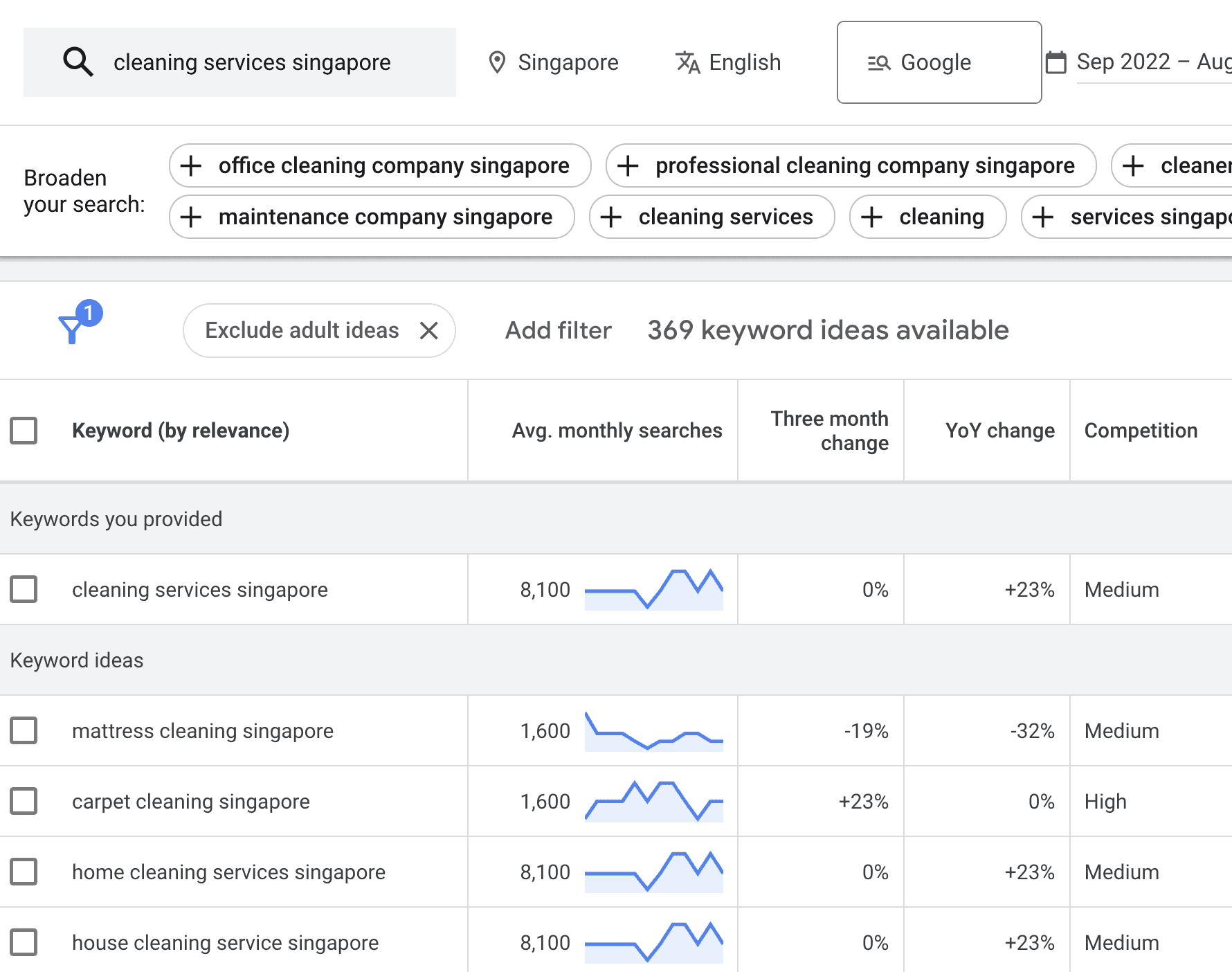
Keeping a record of your keyword research
There are different ways to keep track of your keyword research, but the easiest way is to use a spreadsheet. It is important to include the keywords’ organic difficulty, search volume, and cost-per-click data in your list.
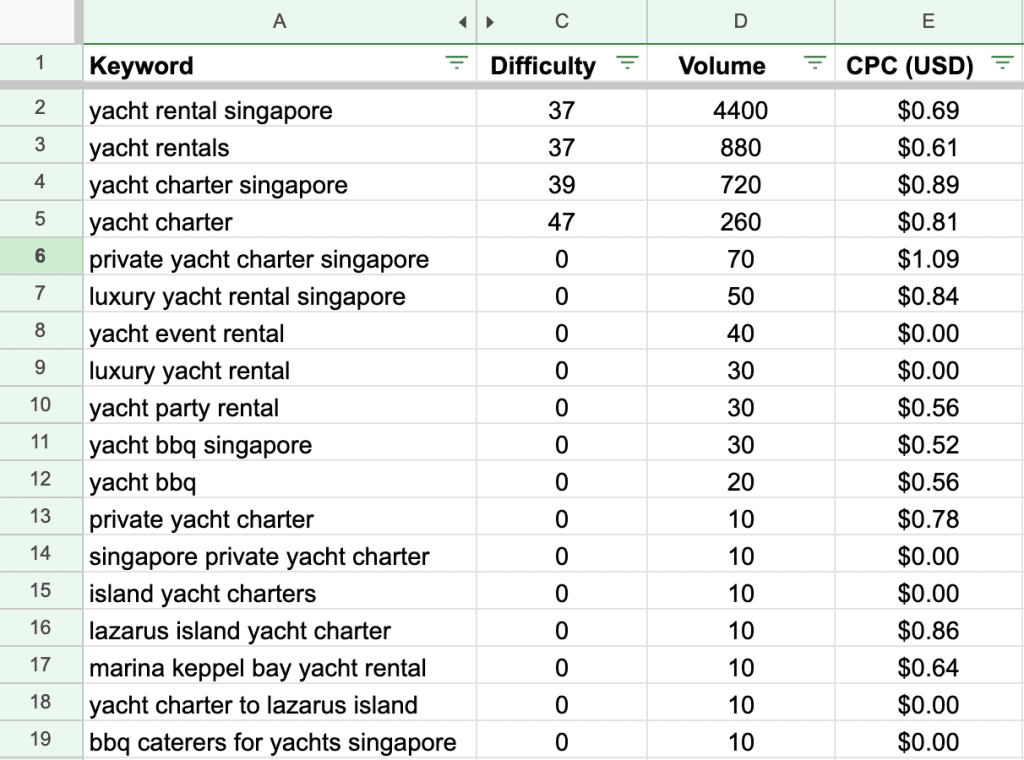
Even though a quick look at related keyword suggestions and manual keyword cluster research may seem complicated, they can give you a lot of useful information.
You can use these measures to figure out which keywords have the most economic value and should be the “core” keywords in your clusters.
Set priorities and make smart choices
Some SEO experts find thousands of keywords when they look for them. But if you are just starting out with this strategy, a hundred keyword phrases should be enough to help you figure out different topic clusters that you can build on on your website.
Above all, you must not overlook how important relevance and search intent are when making your keyword list. You want to use only the keywords that will bring the right people to your website—people who are interested in what you have to give and are likely to buy.
Step 2: Organize Your Keywords into Cohesive Groups
At Nightowl SEO agency, we stress that once you have a complete list of keywords, you will start to notice trends in them. People will use the same words, sentences, synonyms, or subtopics over and over again in their search queries. Potential paths for clustering and forming keyword groups are indicated by these recurrent patterns.
For example, here’s an example about a yacht charter company that provides yacht charter, rental services, bbq parties on a yacht.
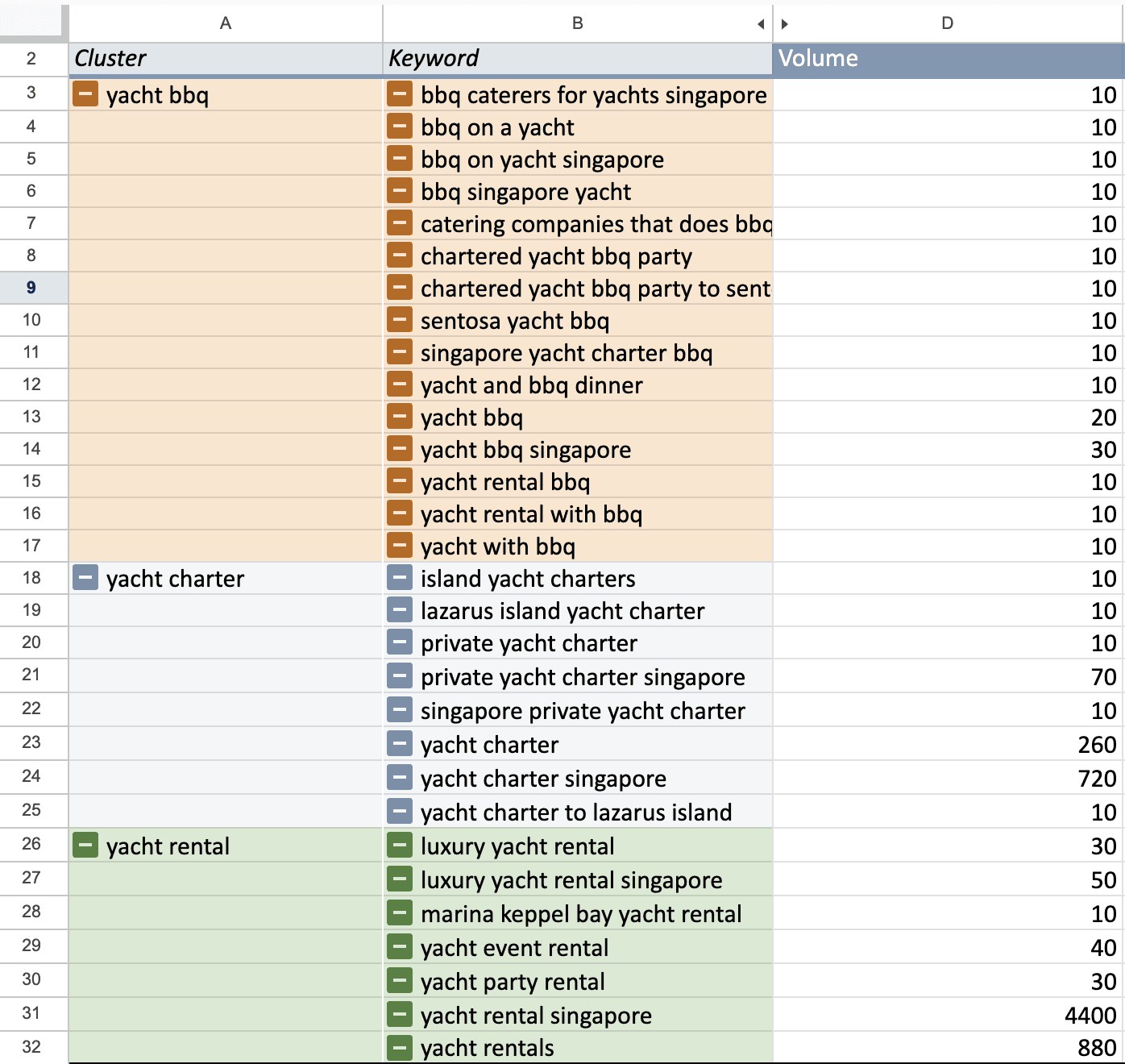
Criteria for putting groups of keywords together
Meaning of the Words / Semantic Relevance
Most importantly, make sure that the keywords in your clusters all have the same search intent. Trying to optimise a landing page for keywords that are too different from each other will make the content confusing and confuse Google about what the page is really about.
Search Volume and Cost-Per-Click
Your keyword clusters’ most important keywords should have a healthy search volume. Also, find out how likely they are to convert based on their CPCs.
Problems with Organic
When adding keywords with higher organic difficulty to your clusters, you should think about your site’s reputation and how long it has been around. Choose keywords that your site can realistically rank well for.
Looking at Two Groups of Keywords
Once you’ve found the main keyword for a cluster, combine it with the other keywords. You could include those that have a long tail, are easy to find, or have a low search volume. Let’s apply this principle to our Yacht Rental business. Now here is our potential cluster.

These keywords work well together as a group because they have similar meanings. People who search these are looking for business relationship management software.
Now, for our second cluster, it could focus on “yacht rental.”

Even though sometimes there a very minor difference in search intentions, they still work well together within their own cluster. The keywords make sense in terms of what they mean, and they all have a high conversion rate and an acceptable organic difficulty.
Step 3: Make pillar pages for your keyword clusters and improve them.
Once your keywords have been carefully grouped into clusters, they will help you create, optimise, and organise the content on your website. Often referred to as “pillar pages,” these keyword clusters represent the core topics of your website.
Back to our example, let’s say we’ve found two main keyword clusters for a yacht rental service company.
Setting up landing pages for each group
To do keyword clustering correctly, it’s important to make landing pages for each keyword cluster. One main page should focus on the platform’s yacht bbq services, while the other should highlight our yacht rental services.
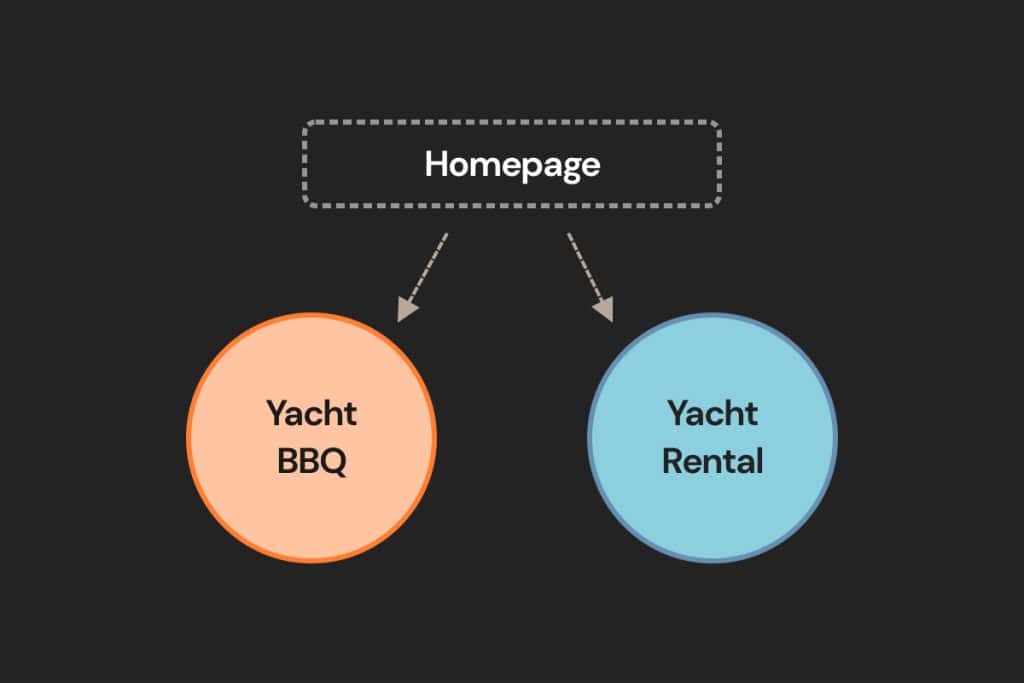
Using the best practises for SEO on a pillar page
The next step is to ensure that on-page SEO best practises should be built into our pillar pages. At Nightowl SEO, we like to use content optimisation tools because they help us refine our content more effectively.
Putting the most important places to improve first
Focus on the following areas to make your pillar pages more likely to rank well:
- Topical Depth: Make a commitment to produce a lot of content that goes into depth about the topic.
- Information architecture: Make sure your site is easy to understand and put your keyword phrases in h2 and h3 tags.
- Page Experience: Add engaging elements like videos, jump links, and carousels to the page to improve the user’s experience.
To summarise, building and improving pillar pages based on your formed keyword clusters is an important step in strengthening your website’s SEO. This is a belief we at Nightowl SEO agency have always held.
Step 4: Add blog content to your keyword clusters to make them stronger.
Next, it’s important to improve the ranking and content credibility of your pillar pages. So, a good way to boost your main keyword clusters is to create blog content that repeats your main keyword clusters.
Using a lot of keyword phrases
These blogs can target longer keyword phrases, subtopics that are related to your main keywords, or questions that are related to your main keywords. For example, if your keyword cluster is about a tool for restaurants to handle deliveries, your blogs could talk about specifics like the best way to route deliveries quickly or how to use GPS tracking for deliveries.
Putting together groups of topics
As you add more content to your website, your web pages will form “topic clusters,” which will reinforce the keyword clusters you already had.

Putting more focus on internal linking
This content’s internal linking profile will be a big factor in figuring out which landing pages of your website get high Google results. To improve your chances of ranking for those more valuable keywords, your blog posts should always link back to the pillar page that goes with it.
Adding more products to clusters by making them bigger
You can add more clusters to your website if your business has many different products or areas of skill. When charted, your website’s content will gradually take on a structured form that looks like a full map of topics and keywords that are related to each other.
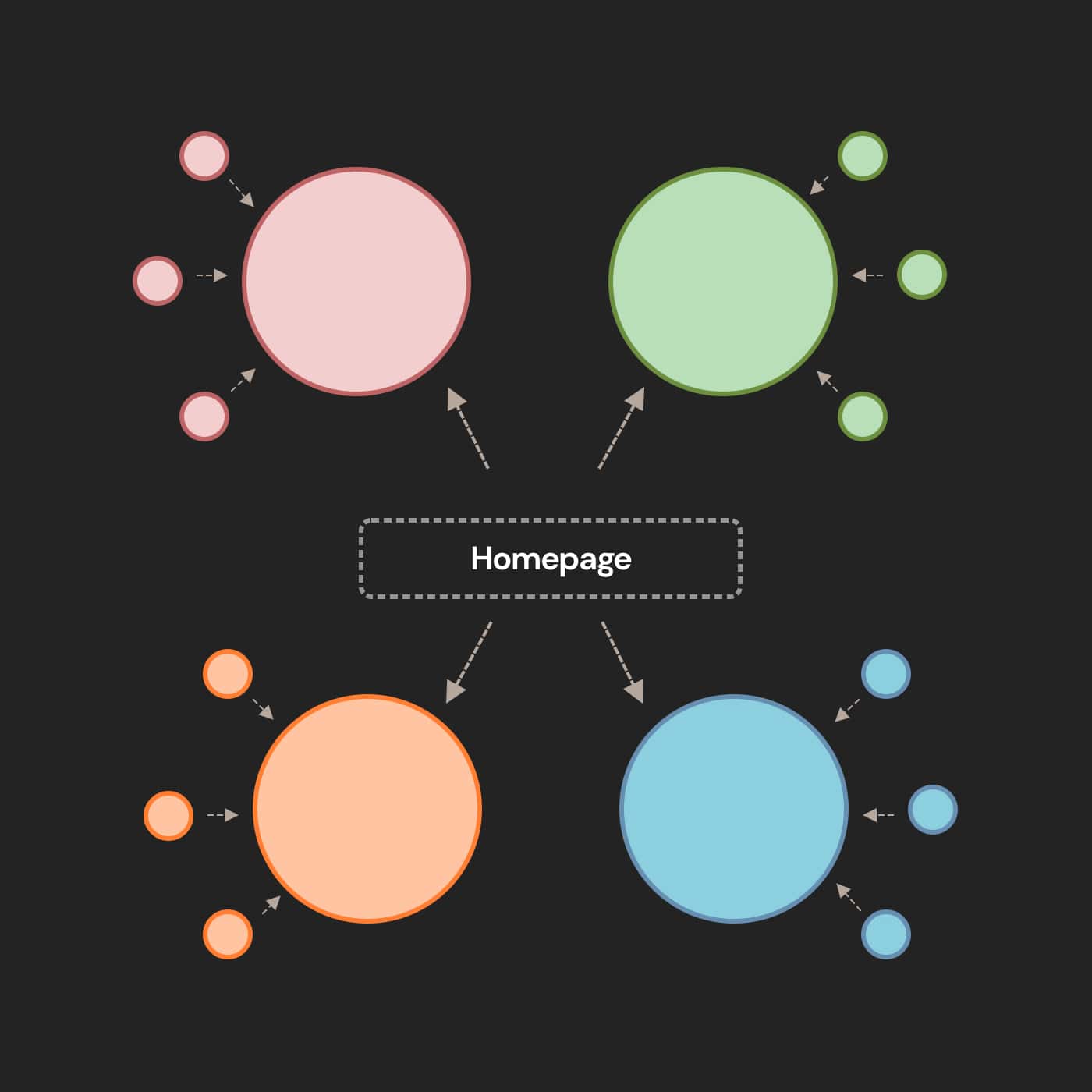
Fewer clusters for single product / service
On the other hand, if your business is focused on a single product or service, you will be able to find fewer keyword clusters. But if you focus on your main topics and write a lot of helpful content about them, you can definitely get ahead of your competitors in a shorter amount of time.
Chances to create more internal links
When you build out your clusters, you also get more chances to add internal links to your website. This approach helps Google figure out which pages are the most important. In additional, by combining the strategic use of internal links and keyword clusters with consistent and relevant blog content, this method helps your website’s ranking and authority a lot.
Is it really worth it to spend time on keyword clustering?
From our years of experience as an SEO agency, observing plenty of algorithm changes, it worth it to dive into the world of keyword clustering? The answer is a clear, thundering “yes.” from NightOwl SEO agency perspective. This more refined SEO approach has the power to give you the edge you need to soar in areas with a lot of competition.
Trying to compete with Google’s dominance
Why is it like this? Mainly because keyword clusters are a great way to take advantage of how good Google is at processing real language and indexing. Think about this for a minute. Google understands easily the millions of keyword phrases used by users in many different fields. It picks up on even the smallest differences between these queries and knows how they are related or different.
Using the NLP models from Google
Google has spent years improving its Natural Language Processing (NLP) models. This has given them the ability to correctly measure content quality signals and predict the web pages that will best answer a searcher’s question. When you use keyword clustering well on your landing pages, you send Google a message that is hard to ignore. It shows that your website is a leader in your field and has a lot of content.
Clusters of Rich Content for Higher Ranking
You also give Google’s content signals rich content clusters that they have been trained to find and promote in search results. This approach requires website owners to look at their content in a different way. It calls for a larger, more expansive view that goes beyond the usual limits.
SEO’s Future: Think Ahead
In the same way, it is clear that keyword clustering is the way SEO will go in the future. If you want to make sure that your web pages get and keep high rankings for a long time, it’s important that your on-page approach keeps changing to match Google’s more advanced features.
In conclusion, Nightowl SEO thinks that starting the journey of keyword clustering is not only a good idea, but also a must if you want to have long-term SEO success and make your website a trusted and powerful voice in the digital world. This isn’t just keeping up with the present; it’s also a smart way to jump ahead, getting ready for how search engine optimisation will change in the future.